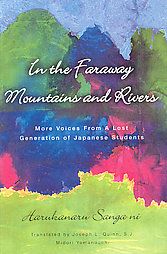The impact of Harukanaru Sanga ni upon its publication in 1947 was immediate and dramatic- -the impetus, many have argued, for a post-war peace movement in Japan that has lasted over half a century. Now the text is available for the first time in English as In the Far Away Mountains and Rivers, a heart-wrenching and thought-provoking collection of letters, journal entries, and essays written by University of Tokyo students as they were drafted to fight in World War II. Many of these students faced certain death as pilots in the kamikaze squads. Many of them deplored the war, and many were simply motivated by a sense of duty to their families and their country. They turned to poetry, philosophy, and religion—all in an attempt to make sense of the universal tragedy of war.
"Translation is from newly designed ed., 1989"--T.p verso.
compiled by Todai Gakusei Jichi-kai Senbotsu Gakusei Shuki Hensan Iinkai (Committee for Compiling the Writings of the University of Tokyo Students Killed in the War and the University of Tokyo Student Council)
The impact of Harukanaru Sanga ni upon its publication in 1947 was immediate and dramatic- -the impetus, many have argued, for a post-war peace movement in Japan that has lasted over half a century. Now the text is available for the first time in English as In the Far Away Mountains and Rivers, a heart-wrenching and thought-provoking collection of letters, journal entries, and essays written by University of Tokyo students as they were drafted to fight in World War II. Many of these students faced certain death as pilots in the kamikaze squads. Many of them deplored the war, and many were simply motivated by a sense of duty to their families and their country. They turned to poetry, philosophy, and religion—all in an attempt to make sense of the universal tragedy of war.
Harukanaru sanga ni : Todai senbotsu gakusei no shuki.
Tokyo : Tokyo Daigaku Shuppankai, 1951 (1958 printing)
